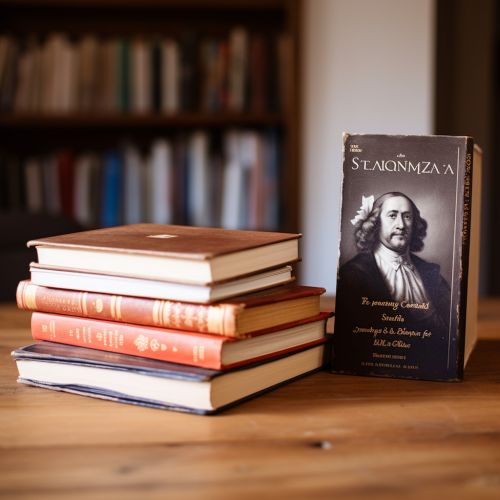Spinoza
Early Life
Baruch Spinoza was born on 24 November 1632 in the Jodenbuurt in Amsterdam, Netherlands. His family were Portuguese Jews who had fled to the Netherlands to escape persecution. Spinoza's father, Michael, was a successful merchant and a respected member of the community. His mother, Hanna, died in 1638 when Spinoza was only six years old.


Education
Spinoza received his early education at the Keter Torah yeshiva of the Amsterdam synagogue, where he studied Hebrew, the Talmud, and the Torah. He also received a secular education, learning Latin, Dutch, and Portuguese, as well as mathematics and science. Spinoza was a brilliant student, and by the age of 17, he was recognized as a promising scholar.
Excommunication
In 1656, at the age of 23, Spinoza was excommunicated from the Jewish community due to his radical philosophical ideas. The cherem document issued by the synagogue declared him to be a heretic and forbade any member of the community from communicating with him. Spinoza did not contest the excommunication and instead chose to leave Amsterdam.
Philosophical Works
Spinoza's philosophical system is one of the most rigorous and consistent in the history of philosophy. His most famous work, the Ethics, is a monumental treatise in which he lays out his metaphysical, epistemological, and ethical views. In it, Spinoza argues for the unity of God and nature, the necessity of all events in the universe, and the identification of good with knowledge and evil with ignorance.


Metaphysics
Spinoza's metaphysics is characterized by monism, the belief that there is only one substance in the universe, which he identifies with God or nature. This view, known as pantheism, is a radical departure from the traditional dualistic view of God and the world as separate entities. Spinoza also rejects the notion of free will, arguing that everything happens out of necessity and that freedom is the recognition of this necessity.
Ethics
In ethics, Spinoza argues that the highest good is the intellectual love of God, which is the same as the knowledge of the unity and necessity of nature. He also maintains that the emotions are not the enemies of reason but can be understood and controlled through it. This leads to a view of ethics based on rational self-interest, where virtue is its own reward.
Legacy
Spinoza's philosophy has had a profound influence on a wide range of fields, including philosophy, theology, political science, psychology, and literature. His ideas have been a source of inspiration for many thinkers, from Kant and Hegel to Einstein and Deleuze.
